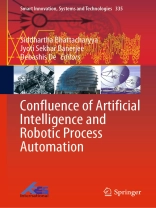This book provides a detailed insight into Robotic Process Automation (RPA) technologies linked with AI that will help organizations implement Industry 4.0 procedures. RPA tools enhance their functionality by incorporating AI objectives, such as use of artificial neural network algorithms, text mining techniques, and natural language processing techniques for information extraction and the subsequent process of optimization and forecasting scenarios for the purpose of improving an organization’s operational and business processes. The target readers of this book are researchers, professors, graduate students, scientists, policymakers, professionals, and developers working in the IT and ITe S sectors, i.e. people who are working on emerging technologies. This book also provides insights and decision support tools necessary for executives concerned with different industrial and organizational automation-centric jobs, knowledge dissemination, information, and policy development for automation in different educational, government, and non-government organizations. This book is of special interest to college and university educators who teach AI, machine learning, blockchain, business intelligence, cognitive intelligence, and brain intelligence courses in different capacities.
Table of Content
Chapter 1. Intelligent Automation Framework using AI and RPA: An Introduction.- Chapter 2. Role of RPA in Intelligent Auditing.- Chapter 3. Impact of AI and RPA in Banking.- Chapter 4. Robotic Process Automation: The key to Reviving the Supply Chain Processes.- Chapter 5. Intelligent Document Processing in end-to-end RPA contexts: a systematic literature review.- Chapter 6. Challenges in Banking and Solving them using RPA.- Chapter 7. Robotic Process Automation in Healthcare.- Chapter 8. Intellectual Property Management in Healthcare Using Robotic Process Automation during Covid-19.- Chapter 9. RPA Revolution in the Healthcare Industry during COVID-19.- Chapter 10. Importance of Artificial Intelligence (AI) and Robotic process automation (RPA) in the Banking Industry: A study from an Indian perspective.- Chapter 11. Integration of RPA and AI in Industry 4.0.- Chapter 12. A Comprehensive Review on Artificial Intelligence (AI) and Robotic Process Automation (RPA) for the development of Smart Cities.- Chapter 13. The Existing IT Functions and Robotics Process Automation.- Chapter 14. RPA Adoption in Healthcare Application.- Chapter 15. Cognitive Io T meets Robotic Process Automation: The Unique Convergence revolutionizing Digital Transformation in the Industry 4.0 era.- Chapter 16. Confluence of Artificial Intelligence and Robotic Process Automation: Concluding Remarks.
About the author
Dr. Siddhartha Bhattacharyya [FRSA, FIET (UK), FIEI, FIETE, LFOSI, SMIEEE, SMACM, SMAAIA, SMIETI, LMCSI, LMISTE] is currently the Principal of Rajnagar Mahavidyalaya, Birbhum, India. Prior to this, he was a Professor at CHRIST (Deemed to be University), Bangalore, India. He also served as the Principal of RCC Institute of Information Technology, Kolkata, India. He has served VSB Technical University of Ostrava, Czech Republic as a Senior Research Scientist. He is the recipient of several coveted national and international awards. He received the Honorary Doctorate Award (D. Litt.) from The University of South America and the SEARCC International Digital Award ICT Educator of the Year in 2017. He was appointed as the ACM Distinguished Speaker for the tenure 2018-2020. He has been appointed as the IEEE Computer Society Distinguished Visitor for the tenure 2021-2023. He is a co-author of 6 books and the co-editor of 88 books and has more than 400 research publications in international journals and conference proceedings to his credit.
Dr. Jyoti Sekhar Banerjee, B.Tech, M.E, Ph.D. (Engg.), is currently serving as the Head of the Department in the Computer Science and Engineering (AI & ML) Department at the Bengal Institute of Technology, Kolkata, India and visiting researcher (Post Doc) at Nottingham Trent University, UK. Additionally, He is also the Professor-in-Charge, R & D and Consultancy Cell of BIT. He has teaching and research experience spanning 18 years and completed one IEI funded project. He is a life member of the CSI, IEEE, ISTE, IEI, ISOC, IAENG and fellow of IETE. He is the present honorary Secretary-cum-Treasurer, of the ISTE WB Section. He is the current honorary Secretary of the Computer Society of India, Kolkata Chapter. He is also the Executive Committee Member of the IETE, Kolkata Centre. He has published over fifty papers in various international journals, conference proceedings, and book chapters. He is the lead author of “A Text Book on Mastering Digital Electronics: Principle, Devices, and Applications”. He has also co-authored another book and is currently processing six edited books in reputed international publishers like Springer, CRC Press, De Gruyter, etc. Presently he is also processing two more textbooks; those are now in press. His areas of research interests include Computational Intelligence, Cognitive Radio, Sensor Networks, AI/ML, Network Security, Different Computing Techniques, Io T, WBAN (e-healthcare), Expert Systems.
Debashis De is a professor in the Department of Computer Science and Engineering and the director of School of Computational Science of MAKAUT, WB, India. He received M.Tech from the University of Calcutta, 2002, and a Ph.D. from Jadavpur University in 2005. He is a senior member-IEEE, fellow IETE, and life member CSI. He was awarded the prestigious Boyscast Fellowship by the Department of Science and Technology, Government of India, to work at the Herriot-Watt University, Scotland, UK. He received the Endeavour Fellowship Award from 2008–2009 by DEST Australia to work at the University of Western Australia. He received the Young Scientist Award both in 2005 at New Delhi and in 2011 in Istanbul, Turkey, from the International Union of Radio Science, Belgium. In 2016, he received the JC Bose research award by IETE, New Delhi. In 2019, he received Siksha Ranta Award by the Govt. of West Bengal. He established the ‘Centre of Mobile cloud computing’ (CMCC) for Io T applications. He published 310 journals and 100 conference papers, fifteen books, and filed eight patents. His h index is 31, citation 5000.Listed in Top 2% Scientist List of the world, Stanford University, USA.












